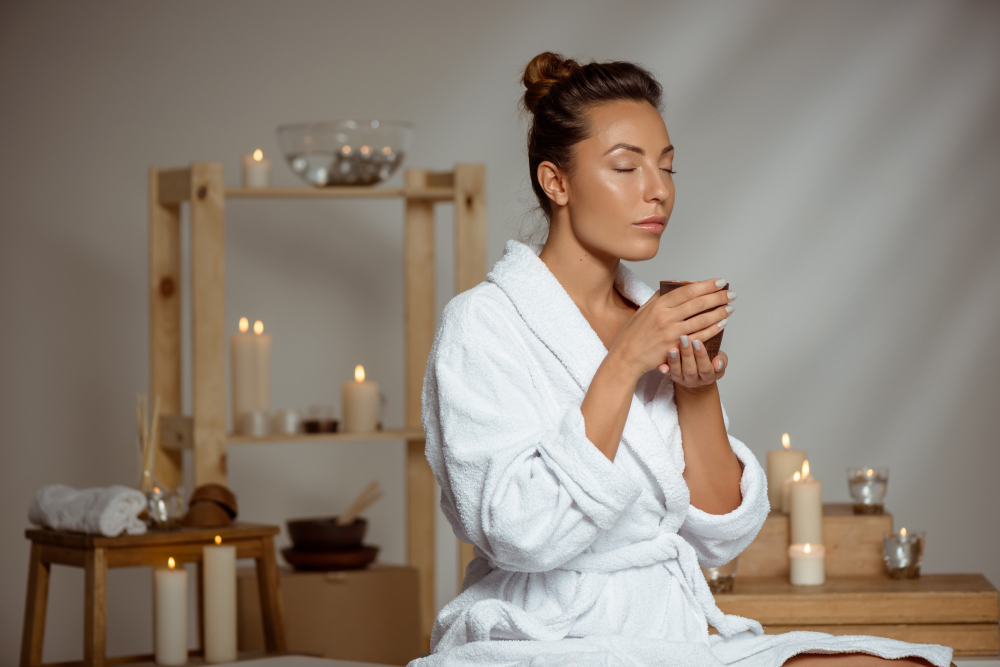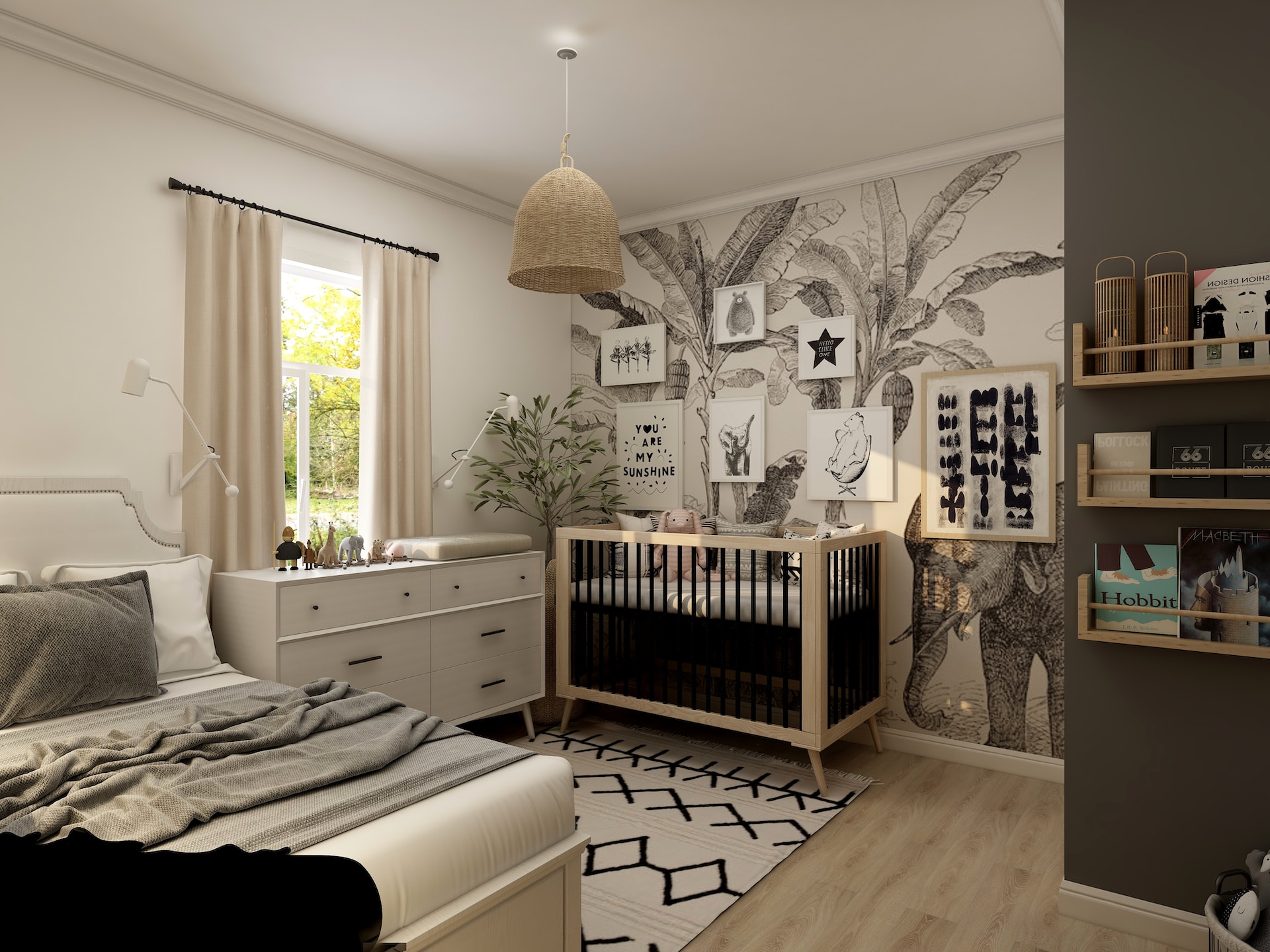A good night’s sleep is a priceless commodity in today’s fast-paced world. It rejuvenates our bodies and sharpens our minds for the challenges ahead. Your sleeping space plays a huge role in getting the quality rest you deserve, making it essential to transform it into a sleep haven. In this article, we’ll walk you through the benefits of restful sleep, exciting home projects to enhance your sleeping environment, and how to elevate your sleeping space for the ultimate slumber experience.
The impact of sleep deprivation
Sleep deprivation is a serious problem that affects a large portion of the population.
- More than 35% of Americans sleep less than seven hours per night.
- In a survey conducted by the Better Sleep Council, 48% of those who self-identified as poor sleepers said their mental health declined in the past year, particularly among parents.
- A Gallup poll found that workers who typically get a poor night’s sleep report more than double the rate of unplanned absenteeism compared with other workers, resulting in an estimated $44.6 billion in lost productivity each year.
- Short sleep duration and sleep insufficiency vary by demographic and geographic characteristics, and understanding these differences can help programs prioritize efforts to improve sleep health.
- Sleep deprivation can lead to long-term health problems such as diabetes, heart disease, and obesity.
- Falling asleep takes an average of 10-15 minutes, and if you pass out within a few minutes, it might mean you are sleep-deprived.
Sleep is incredibly important for both physical and mental health. To ensure that you are getting enough sleep, it is important to establish good sleep hygiene habits.
Benefits of a good night’s sleep
Quality sleep isn’t just a luxury; research has shown that it’s a cornerstone of a healthy lifestyle.
- Strengthen immunity and well-being: Getting enough rest fortifies your immune system, empowering your body to fend off illnesses and infections.
- Supercharge cognitive function: A well-rested mind is sharper, more focused, and better primed for problem-solving and learning.
- Balance mood and emotions: Ensuring sufficient sleep stabilizes your emotions and reduces the risk of mood disorders.
- Promote physical health: It plays a crucial role in tissue repair and growth, regulates blood pressure, and aids in maintaining a healthy weight.
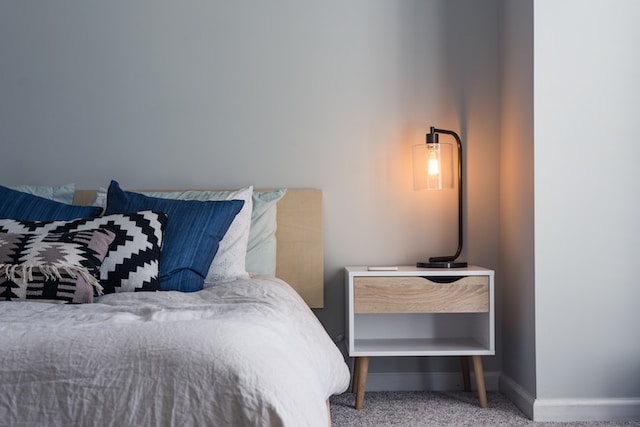
Home improvement ideas to transform your sleeping space
DIY soundproofing
Achieving better sleep quality through soundproofing your home can sometimes require more than professional intervention, but there are several effective DIY methods you can implement:
- Sealing gaps and cracks: Start by inspecting your windows and doors for any gaps or cracks. Apply weatherstripping or caulking to seal these openings and prevent sound from seeping.
- Double-glazed windows: Consider installing double-glazed windows, which provide an extra layer of insulation against external noise. These windows can significantly reduce the amount of sound entering your sleeping space.
- Heavy curtains or blinds: Invest in thick, heavy curtains or blinds. These enhance your décor and act as effective barriers against outside noise, helping create a quieter environment.
- Carpets and rugs: Incorporate soft floor coverings like carpets and rugs. These add a cozy touch to your sleeping space and absorb sound, reducing echoes and minimizing noise transmission.
- DIY acoustic panels: Create your acoustic panels using foam or fabric materials. Mount these on walls to absorb sound waves, particularly in rooms prone to higher noise levels.
Incorporating principles of Vastushastra, the ancient Indian architectural tradition, can also enhance the harmony of your sleeping space. It emphasizes the balance of energies within a space to promote well-being and restful sleep.
Professional soundproofing projects
For more comprehensive soundproofing, especially in areas where high noise levels are a persistent issue, consider professional solutions.
- Acoustic insulation: Invest in specialized acoustic insulation for walls and ceilings. This material is designed to significantly reduce the transmission of sound between rooms, providing a high level of noise reduction.
- Soundproofing drywall: Replace existing drywall with soundproof variants designed to absorb and block sound waves. This can be particularly effective in shared walls between bedrooms and noisy areas.
- Mass-loaded vinyl (MLV): MLV is a dense, flexible material that can be added to walls, floors, and ceilings to enhance soundproofing. It’s especially useful in areas where noise transmission is a persistent issue.
- Acoustic caulking and sealants: Professionals use specialized acoustic caulking and sealants to create airtight seals around windows, doors, and other potential sound entry points.
- Soundproof windows and doors: Consider upgrading to specially designed soundproof windows and doors. These are engineered with multiple layers of glass and additional insulation to provide maximum noise reduction.
Remember, the choice between DIY and professional soundproofing largely depends on the level of noise you’re dealing with and your budget. Combining both approaches, where applicable, can provide the best solution for achieving optimal sleep quality.
DIY air quality improvement
- Natural ventilation: Take advantage of good weather by opening windows and doors to allow fresh air to circulate. This helps remove indoor pollutants and replenishes oxygen levels.
- Houseplants: Incorporate houseplants like spider plants, snake plants, or peace lilies. These plants can help purify the air by absorbing toxins and releasing oxygen.
- Regular cleaning: Dust and vacuum regularly to reduce allergens like dust mites, pet dander, and pollen. Use a vacuum cleaner with a HEPA filter to trap smaller particles.
- Air purifiers: Consider investing in a high-quality air purifier with a HEPA filter. This device can help remove airborne particles, allergens, and pollutants from your indoor air.
- Avoid chemicals: Opt for natural cleaning products and avoid using harsh chemicals, which can release harmful fumes into the air. Look for eco-friendly alternatives.
Professional air quality improvement
- HVAC maintenance: Schedule regular maintenance for your heating, ventilation, and air conditioning (HVAC) system. This ensures proper filtration and ventilation, helping to maintain high air quality.
- Air duct cleaning: Over time, dust, mold, and other contaminants can accumulate in your air ducts. Professional cleaning can help remove these pollutants and improve air circulation.
- Air quality testing: Consider hiring a professional to conduct air quality testing. This comprehensive assessment can identify specific pollutants and allergens present in your home.
- Ventilation systems: Install or upgrade your ventilation systems, especially in areas like the kitchen and bathroom, to ensure proper airflow and minimize the buildup of pollutants.
- Humidification/dehumidification: Depending on your climate, installing a humidifier or dehumidifier can help maintain optimal humidity levels, preventing mold growth and reducing allergens in the air.
- Sealing air leaks: A professional can identify and seal any gaps, cracks, or leaks in your home’s structure. This helps prevent the infiltration of outdoor pollutants and allergens.
As you invest in soundproofing and air quality improvements, reviewing your home insurance policy to ensure it adequately covers these upgrades is important. Knowing that your investment is safeguarded against unforeseen events will give you peace of mind. Consult your insurance provider to discuss any necessary adjustments or additional coverage options to ensure your home is fully protected.
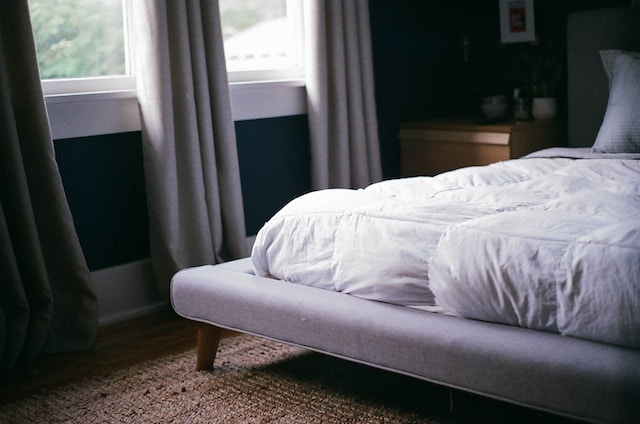
Smart solutions for your sleeping space
Upgrading your mattress for optimal comfort
A good mattress is one of the best investments you can make. After all, you spend ⅓ of your life on it. Over time, mattresses can lose their firmness and support, leading to discomfort and disrupted sleep. Consider a new mattress if you have been experiencing aches and pains or restless nights to improve your bedroom space.
- Assess your needs: Determine if you prefer a firmer or softer mattress, and consider any specific features like memory foam or latex for tailored support.
- Trial periods and guarantees: Look for brands that offer trial periods or guarantees, allowing you to test the mattress in your home to ensure it meets your comfort needs.
- Explore technological advancements: Consider advanced mattress technologies like adjustable firmness or temperature-regulating features for a customized sleep experience.
- Eco-friendly options: If sustainability is a priority, explore mattresses made from organic or eco-friendly materials that promote a healthier sleeping environment.
Pillow power: finding the perfect support
Choosing the right pillows can significantly enhance your sleep quality. The right pillow provides proper neck and head support, reducing discomfort and promoting better alignment. Here’s what to consider:
- Sleeping position matters: Select pillows tailored to your position – whether you’re a back, side, or stomach sleeper.
- Material selection: Opt for hypoallergenic and breathable materials like memory foam, latex, or down alternatives to minimize allergens and maximize comfort.
- Invest in pillow protectors: These covers provide an extra layer of defense against allergens, ensuring your pillows stay clean and allergen-free.
Bedding essentials for a serene sleep sanctuary
Investing in quality bedding ensures you not only sleep better but wake up feeling refreshed and rejuvenated.
- Invest in quality sheets: Opt for natural fabrics like cotton, bamboo, or
- eucalyptus fiber for a comfortable and cool sleep surface.
- Consider the right duvet or comforter: Choose a weight and fill that aligns with your sleeping preferences and the climate of your area.
- Layer with blankets or throws: Easily adjust your warmth level by adding or removing layers, ensuring you stay cozy without overheating.
- Mindful color choices: Select calming and natural hues for your bedding to create a tranquil ambiance that promotes relaxation.
Aromatherapy: elevating your sleeping space
Aromatherapy can transform your sleeping space into a serene sanctuary. Scents like lavender, chamomile, and eucalyptus have calming properties that promote relaxation. You can take very simple steps to incorporate aromatherapy into your bedtime routine.
- Essential oil diffusers: Invest in a high-quality diffuser to disperse calming scents throughout your room. Ensure you use pure, therapeutic-grade essential oils for optimal benefits.
- Bedding and linens: Infuse your bedding with calming scents by adding a few drops of essential oil to your laundry detergent or linen sprays.
- DIY potpourri: Create your natural potpourri using dried flowers and essential oils. Display it in a decorative bowl near your bed for a subtle, soothing fragrance.
Sleeping gadgets: technology for better sleep
Cutting-edge sleep technology can further enhance your sleep environment. Several products can aid in helping lull you to a blissful night’s sleep.
- Smart sleep monitors: Devices like sleep trackers or smartwatches can provide insights into your sleep patterns, helping you adjust for better rest.
- White noise machines: These gadgets mask disruptive noises, creating a more serene sleeping environment.
- Light therapy lamps: Especially beneficial for those with irregular sleep schedules, these lamps mimic natural light, helping regulate your circadian rhythm.
- Adjustable bed bases: These allow you to customize your sleeping position, providing optimal support for your body.
These sleep solutions can make a huge difference in the quality of rest you experience. By upgrading your mattress, pillows, aromatherapy, and innovative sleeping gadgets, you’re creating the best environment for rejuvenating sleep.

Maximizing mindful mornings and nights
Morning and nightly rituals are the foundation of a productive and balanced day. A mindful morning and night routine can set a positive tone for the hours ahead, enhancing your overall well-being.
The power of morning and nighttime rituals
Morning rituals offer a range of benefits that contribute to improved physical, mental, and emotional well-being.
- Mental clarity and focus: Engaging in purposeful activities in the morning primes your mind for sharper focus, creativity, and productivity throughout the day.
- Reduced stress and anxiety: A structured morning routine can help alleviate stress and anxiety by providing control and predictability.
- Enhanced physical health: Incorporating activities like exercise, hydration, and nourishment in the morning kickstarts your metabolism and sets a healthy tone for the day.
- Improved emotional well-being: Starting your day with mindfulness practices, gratitude exercises, or affirmations can promote a positive outlook and emotional resilience.
- Boosted motivation and confidence: Achieving small, meaningful tasks early in the day can build a sense of accomplishment and boost self-confidence.
Nighttime rituals, on the other hand, serve as a bridge to restful sleep and prepare you for the day ahead.
- Relaxation and unwinding: Dedicate some time to relax your body and mind. This could involve reading, gentle stretching, or a warm bath.
- Reflective journaling: Spend a few moments reflecting on your day. Write down any accomplishments, challenges, or thoughts that come to mind. This can help clear your mind and prepare you for a peaceful sleep.
- Gratitude practice: Similar to the morning routine, take a moment to acknowledge the positive aspects of your day. This can help cultivate a sense of contentment and positivity.
- Mindfulness or meditation: Engage in calming practices, like breathing exercises, that help shift your focus from the day’s activities to a more peaceful state of mind. This can promote a sense of tranquility before sleep.
- Digital detox: Avoid screens and electronic devices at least an hour before bed. The blue light emitted from screens can disrupt your circadian rhythm, making it harder to fall asleep.
- Natural remedies: Consider incorporating natural sleep aids like melatonin or valerian root to support a restful night’s sleep. Consult with a healthcare professional before adding any health supplements to your bedtime routine.
Foods to avoid: Limit consumption of caffeine and sugary foods in the hours leading up to bedtime, as they can interfere with your ability to fall asleep and achieve a deep, restful rest. Opt for healthy snacks in the evening.
- Gentle stretching or yoga: Incorporate light stretches or gentle yoga poses to release any tension in your body and prepare for a restful sleep.
- Preparation for the next day: Lay out what you’ll need for the following day, whether it’s clothes, work materials, or a to-do list. This can help you start the day with a sense of organization and purpose.
- Keep a routine: Having a bedtime routine as an adult can be beneficial to teach your body to wind down and rest for the night.
Remember, the key is consistency. Integrating these practices into your morning and nighttime routines becomes second nature, providing a solid foundation for your well-being and overall quality of life.
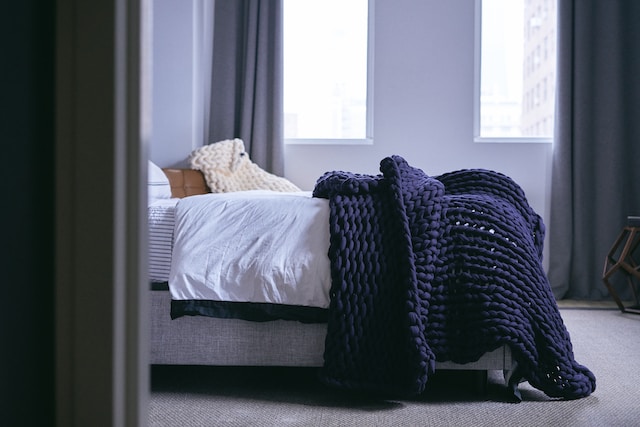
Your sleeping space is more than just a room, it’s a sanctuary where dreams take flight. By incorporating these simple yet effective ideas, you’re on your way to creating a haven that nurtures restful slumber. So, embark on this journey, and remember, a well-rested you is a healthier, happier you. Sweet dreams!



